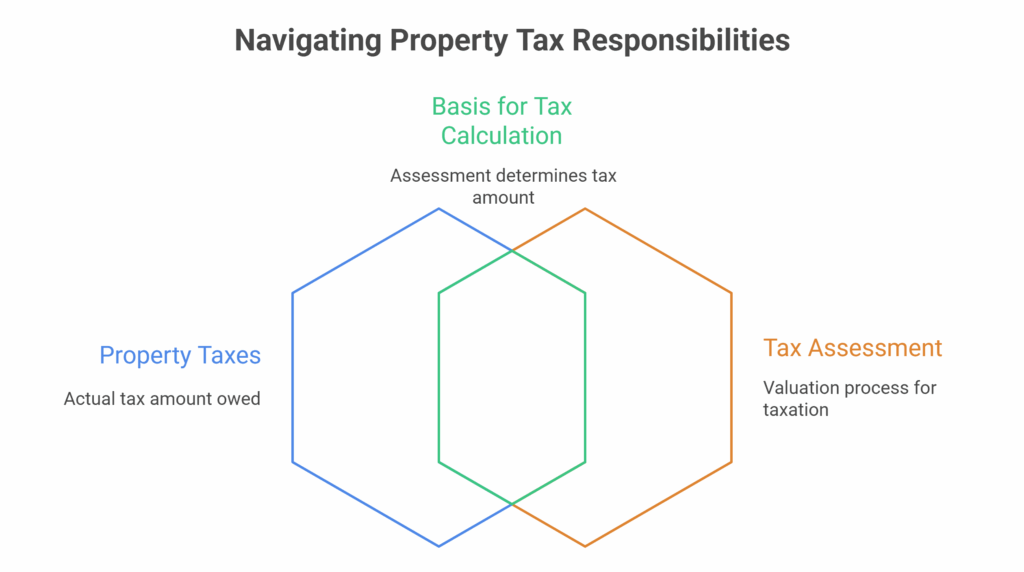Quick Answer: What’s the Difference Between Property Taxes and Tax Assessment?
What’s the Difference Between Property Taxes and Tax Assessment? The short answer is that property taxes are the actual payments homeowners make to local governments, while a tax assessment is the process of determining a property’s market value to calculate those taxes. Think of the assessment as the “measuring stick” and the property tax as the bill that follows. Assessors evaluate factors like location, size, and improvements to set the property’s assessed value, and then tax rates are applied to determine what you owe.
In simple terms, the assessment sets the stage, and the tax is the final act.
Now let’s dive deeper.

What is a Property Tax?
Property tax is an annual amount paid by a property owner to the local government. This tax is used to fund public services such as schools, road maintenance, emergency services, and community development projects. In Texas, property taxes are collected at the county level and vary depending on where the property is located.
The actual amount of property tax you owe is determined by applying a local tax rate (often called a “mill rate”) to your property’s assessed value. So, in essence:
Property Tax = Tax Rate × Assessed Property Value
These taxes are typically due annually, though some homeowners choose to pay them monthly through their mortgage escrow accounts. Regardless of the payment method, failure to pay property taxes on time can lead to penalties and, in extreme cases, foreclosure.
What is a Tax Assessment?
A tax assessment is the process by which the local government determines the value of your property for taxation purposes. This is not necessarily the same as your home’s market value or what it would sell for in an open market. Instead, it’s a value determined by a tax assessor, based on a variety of factors like:
- Lot size
- Building square footage
- Number of bedrooms and bathrooms
- Home improvements or renovations
- Comparable properties in your neighborhood
The purpose of a tax assessment is to ensure property taxes are applied fairly and accurately. For example, if you recently added a new deck or remodeled your kitchen, the assessed value of your home could increase, resulting in higher property taxes the following year.
Key Differences Between Property Taxes and Tax Assessments
To put it simply:
- Tax assessment is the process of determining your property’s value.
- Property tax is the amount of money you pay, based on that assessed value and the applicable tax rate.
Here’s a helpful analogy:
Think of tax assessment as the appraisal done before selling your home. It tells you how much your property is worth in the eyes of the local government. Property taxes, on the other hand, are like the bill you receive based on that value.
Timeframe & Frequency
- Assessments are typically done annually or every few years, depending on your county or municipality.
- Taxes are billed annually, and the amount may fluctuate based on changes to your assessment or local tax rates.
Who Sets Each?
- Tax assessments are done by the local tax assessor’s office.
- Property tax rates are set by local governing bodies — like city councils, school districts, and county commissions.
Can You Dispute Them?
Yes, both can be challenged — but in different ways. If you believe your property’s assessed value is too high, you can file an appeal with your local appraisal review board. If you’re questioning the fairness of your property tax rate, that’s more of a policy issue that may require public input or voting.
Why It Matters to House Buyers in Texas?
If you’re among the many house buyers Texas welcomes each year, it’s vital to understand how these concepts impact your bottom line. A home with a low purchase price may still come with high property taxes if the assessed value is high or if it’s located in a district with elevated tax rates.
Likewise, even if the tax rate remains stable, your tax bill can rise if the assessed value increases due to improvements or rising market values in your neighborhood.
Before buying, always ask:
- What is the current assessed value of the property?
- How often is it reassessed?
- What is the current property tax rate in the area?
- Are there any exemptions (like homestead exemptions) you might qualify for?
Professional house buyers in Texas often review these details closely to avoid surprises after the purchase. They may also use the tax assessment history to negotiate the purchase price or anticipate future tax obligations.
How Sellers Can Benefit from Understanding Tax Assessments?
Homeowners looking to sell should also pay attention to their property’s assessed value. If it’s significantly higher than market value, potential buyers might be scared off by the anticipated property taxes. In such cases, appealing the tax assessment before listing the property could make your home more attractive.
Alternatively, if you’ve recently made improvements to the home but they haven’t yet affected your assessed value, this could be a selling point lower property taxes for a more upgraded house.
Final Thoughts
In summary, property taxes and tax assessments are closely linked but serve different purposes in the homeownership journey. While the assessment determines the value of your property, the property tax is what you actually pay based on that value and your local tax rate. Understanding both can help you make informed decisions, whether you’re buying, selling, or simply managing your current home.
Ready to Buy or Sell in Texas?
Whether you’re trying to avoid rising property taxes or want to buy a home with low assessed value, we’re here to help. Our team specializes in working with house buyers Texas trusts — offering fast, fair, and transparent real estate solutions.
Call us anytime at 713-561-5162 or connect with us on our website and we’ll lay out all of your options for your specific situation.
